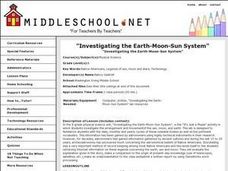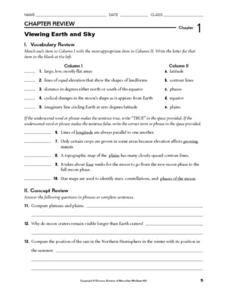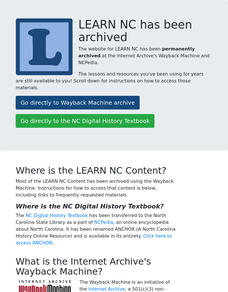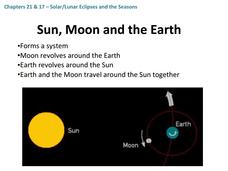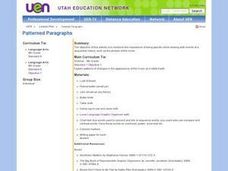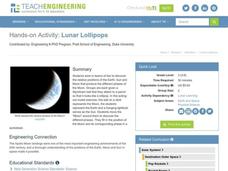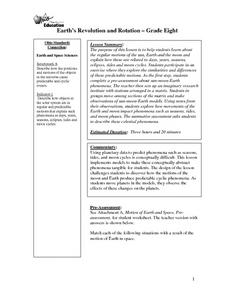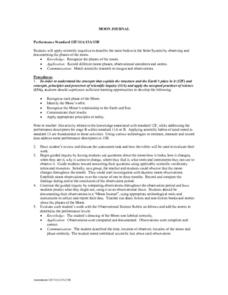Curated OER
Phases of the Moon
Students use a simple physical model of the Earth, sun, and moon to understand why the moon changes phases from the perspective of Earthly observers. They hold up balls representing the moon in a room with a single light source to see...
Curated OER
How Does the Moon Affect Tidal Range?
Eighth graders study the phases of the moon. In this tides lesson plan students use the Internet to retrieve information.
Curated OER
Investigating the Earth-Moon-Sun System
Eighth graders research Native American legends involving the sun, moon, and stars and compare them to the origin of present day knowledge. They create a written report and make an oral presentation of their findings to the class.
Curated OER
How Does the Moon Move?
In this moon worksheet, students will fill in the blank of 6 statements relating to how the moon rotates around the Earth including the phases of the moon.
Curated OER
Sampling Rocks
Students investigate rocks. In this earth science lesson, students collect rocks from the schoolyard and describe each of the rocks. Students measure and weigh each rock and record the results. Students create a rock guide for the...
Curated OER
Exploring the Night Sky: Fall/Winter
Learners explain how moon phases occur. They explain three ways that the night sky has been used through history. Students locate some of the constellations in the night sky. They discuss stories and myths surrounding stars.
Curated OER
Viewing Earth and Sky
In this earth and sky worksheet, students review terms associated with map reading. Students also review topographic maps and how contour lines represent elevation. This worksheet has 5 matching, 5 true or false, 5 fill in the blank, and...
Curated OER
Season's Greetings
Students explore Earth's seasons using an interactive website. In this earth science lesson, students watch video segments and explain Earth's seasonal milestones. They discuss the factors that causes seasonal changes.
Curated OER
The Moon
Third graders identify the phases of the moon. They use the internet to see the different phases of the moon on different dates. They form their own opinions from the information they have read and justify their opinions to their...
Curated OER
Solar/Lunar Eclipses and the Seasons
How do the moon, sun, and Earth line up to create eclipses? Why do the seasons change throughout a year? The answers to these questions are explained through this series of slides. This apt presentation outlines information using bullet...
Curated OER
The Phases of the Moon
Students view an applet to study the phases of the Moon in relation to the orientation of the sun, moon, and Earth.
Curated OER
Wax On, Wane Off
Students explore the Earth's only natural sattelite, the moon. They view a demonstration using tennis balls of the waxing crescent moon, waxing gibbous moon and a lunar eclipse.
Curated OER
Astronomy
Students explore space science by utilizing education software. In this moon cycles lesson, students discuss the importance of the moon and the different phases we observe from earth. Students demonstrate the earth's orbit by creating a...
Curated OER
Lunar Language
Students use a Lunar Language Graphic Organizer to draw and describe the phases of the moon. They explain patterns of changes in the appearance of the moon as it orbits Earth.
Curated OER
Patterned Paragraphs
Young scholars reinforce the importance of being specific while dealing with events of a sequential nature, such as the phases of the moon.
Curated OER
I'm Being Followed By a Moonshadow
Students explore solar and lunar eclipses and how the sun, Earth, and moon cause them.
Curated OER
Lunar Lollipops
Learners work with a partner, Styrofoam ball and light source to simulate the positions of the Earth, Moon and Sun at various stages during the phases of the Moon. They describe why the Moon is visible from Earth and complete a worksheet.
Curated OER
Moon Observations
Third graders create a model of the moon and use a flashlight to illustrate the various stages of the moon.
Curated OER
Earth's Revolution and Rotation
Eighth graders investigate the regular motions of the sun, Earth and the moon and explain how these are related to days, years, seasons, eclipses, tides and moon cycles. They participate in an exercise where they explore the...
Curated OER
Tides
Pupils discover how the position of the Sun, Moon and Earth affect tides. In this science lesson, students view a presentation about the tides. Pupils discuss the different types of tides.
Curated OER
Moon Journal
Fourth graders observe Moon and its features, and record results both in written form and in a drawing on the given template.
Columbus City Schools
Experiencing Eclipses
Don't be caught in the dark! Young scientists investigate the causes of both solar and lunar eclipses using an interactive to help them understand the development of an eclipse over time. They then research facts and characteristics of...
Curated OER
Types of Tides
In this tides learning exercise, learners are given different diagrams of the sun, moon and earth in relation to each other. Students determine the type of tides created in each diagram and identify the phase of the moon.
Curated OER
Moon Observations
Learners study the science of the moon. In this moon observations instructional activity, students study vocabulary associated with the moon, study a lunar calendar, and a phases of the moon's orbit around the Earth.




